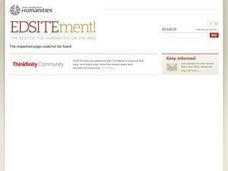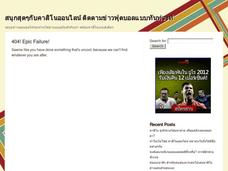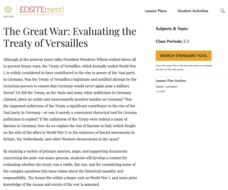National Endowment for the Humanities
How "Grand" and "Allied" Was the Grand Alliance?
Learn more about the Grand Alliance with a scaffolded lesson plan that includes four activities. Class members use primary sources to complete a map exercise, understand the goals and objectives of each individual nation, and participate...
Curated OER
Victory in Europe, 1944-1945
High schoolers examine the overall strategy pursued by the Allies in the final moths of World War II in Europe by examining military documents and consulting an interactive map of the European theater.
Curated OER
Turning the Tide in the Pacific, 1941-1943
Learners explore the overall strategies pursued by the Japanese and the Allies in the initial months of World War II. What each side hoped to accomplish what what actually happened forms the basis of a comparison made in this lesson.
Curated OER
Victory in the Pacific, 1943-1945
Students examine the military campaigns of the Pacific theater, tracing the path of the Allied offensives. The lesson presents what the Allies were trying to accomplish and why.
Curated OER
World War II New Guinea Campaign
Although the big picture for this lesson on the New Guidea Campaign of WWII is taking a field trip to the Douglas MacArthur Memorial, you can easily use it as a guide to an independent or group research project as well. However, if you...
National Endowment for the Humanities
The New Order for "Greater East Asia"
Sometimes the New Order becomes synonymous with its implications for European countries, but what about its consequences for East Asia? The final instructional activity in a four-part series teaches scholars about World War II. High...
Curated OER
The Ultimate Sacrifice
Students explore the concept of sacrifice during wartime. In this World War II lesson, students explore the Allied and Axis Powers that existed during the war. Students discover sacrifices that were made by both powers during the war as...
Curated OER
Mapping and Personifying Nations
Eleventh graders analyze the geography, actions, and relationships of countries involved in World War II. They create a map of Europe, Northern Africa, and the Pacific, and analyze and evaluate their self-made map of Europe and the...
American Battle Monuments Commission
The Battle of the Atlantic
World War II is known for its land and air battles in Europe, but the waters of the Atlantic saw its share of skirmishes from 1939 to 1945. Learn more about the roles of the Allied powers in establishing ocean territory during World War...
University of California
Decolonization
The ripple effect from one small event can impact many others. Young historians research the ripple effect World War II had on decolonization in the second installment of an eight-part series. Through primary and secondary documents as...
Curated OER
Mapping the War
Young scholars work in pairs to draw their own maps as specified of World War II areas. When all projects have been completed let one group at a time share their assignments with the rest of the class. Compile all the maps into a...
Curated OER
The Legacy of the "Great War"
Young scholars study how the map of Europe changed as a result of the Treaty of Versailles at the end of World War I. They examine the results of the end of the Cold War.
National History Day
Why Did the United States Enter World War I in 1917?
World War I was the first major conflict on a global scale. Using primary documents, learners determine why the United States chose to enter World War I when it did. After analytical writing and group research, the causes of America's...
Shaker Junior High School Library Media Center
WWII Project Outline
Work together as a class and get to know the ins and outs of World War II with this engaging collaborative project. Class members are broken into groups to research particular war topics, from life on the home front to the Holocaust and...
Curated OER
The Great War: Evaluating the Treaty of Versailles
Young scholars examine and evaluate the Treaty of Versailles. They read and discuss primary source documents, explore various websites, develop a list of postwar goals for France, Germany, and the U.S., and evaluate whether the treaty...
Curated OER
Never To Forget
Tenth graders discuss the events leading up to antisemitic behavior in Europe during World War II. Through various activities, 10th graders acquaint themselves with the political ideology of Nazism and assess responsibility for the...















